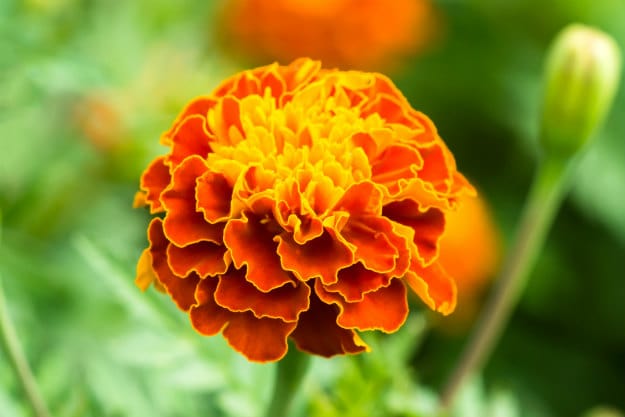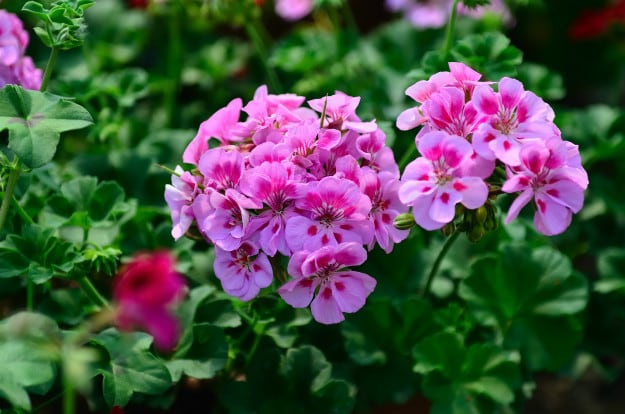Warmer temperatures are here, which means summertime is just around the corner. With all the fun and sun that summer brings, it also unfortunately brings along nature’s perpetual pest – mosquitoes. These pesky insects can easily ruin your quality gardening time, so what better way to make sure that you get to tend your plants in peace than by investing in plants that actually repel mosquitoes?
Mosquitoes Be Gone!
Below you’ll find a list of nature’s own natural mosquito repellants, as well as some additional tools and tips to ensure that these pests are kept far at bay and you get to focus your quality time back on your garden!
Lavender:
This plant does much more than make an appearance in your favorite perfume or tea. Have you ever noticed how other insects, and even frequent garden animals such as rabbits, never decimate a lavender plant? Their beautiful fragrance actually hinders a mosquito’s ability to smell! Lavender is also one tough plant – it is highly durable in extreme heat and is drought-resistant once it has been fully established in a garden. It actually thrives best in warmer temperatures, so southern homesteaders rejoice!
Marigolds:
Similarly to lavender, marigolds are another beautiful garden addition that emit a smell which deters mosquitoes from flying near. These potted plants should be placed near your front door or on the back patio to ensure that mosquitoes do not go flying where they’re least wanted and risk slipping inside to escape from the summer heat. Marigolds are good for more than repelling mosquitoes – professional gardeners have even observed that they will deter aphids, thrips, whiteflies, bean beetles, squash bugs and tomato hornworms.

Citronella Grass:
You might not know it by name, but you would certainly know it by smell. This plant is the most commonly found ingredient in store-bought mosquito repellant sprays, and for good reasons; this low-maintenance plant is easily the most effective at repelling mosquitoes when planted live in a garden. It should be housed in large planter with other vegetation, as it does not do well in colder climates and thrives in the heat. Depending on how warm your climate gets in the summer, citronella grass can even be planted directly into the ground.
Catnip:
Part of the mint plant family, catnip has similar powers of aroma in repelling mosquitoes from your garden. Catnip is easy to access and is highly available in all garden and home center stores, and is highly effective in deterring those pesky bugs from disturbing your garden. Unfortunately, it can tend to be a bit invasive and might start to take over the rest of your garden if not monitored carefully.
Rosemary:
This plant comes highly recommended as a natural mosquito repellant by the New York Botanical Garden Society. Their woody, earthy scent not only repels mosquitoes, but has been known to scare off other pesky insects such as cabbage moths and carrot flies.

A positive upside to growing rosemary in your garden is that it does well in containers, which means that it could grow and thrive in climates that experience winters. They also do equally as well in hot or dry climates. Need a few more reasons to love rosemary? It can be easily pruned into decorative shapes or borders to jazz up your garden, and you can add it to a garden salad or use it as a seasoning for your favorite summer dishes!
Basil:
Much like rosemary, this herb that is traditionally used to season and spice up a number of dishes can also be used to repel mosquitoes. All types of basil will effectively accomplish this aim, so you should feel free to experiment with different types of basil and find a type that works best with your garden and your sense of smell. To maintain basil, make sure that the herb is kept damp, is drained thoroughly and frequently, and enjoys lots of sunshine. Basil can be planted directly in the garden alongside the other plants, or can be kept in a container with other flowers or herbs, as long as they are grown and sprout at the same time.
Scented geraniums:
This is one final popular option that you might decide to use as a natural mosquito repellant. Also recommended by the New York Botanical Garden, this lemon-scented flower serves the same function as the previous plants in that its smell deters mosquitoes from flying near. Like most of the others, scented geraniums flourish best in hot, dry, and sunny environments, but can be maintained and kept in colder environments with lots of pruning and attention to growth.

Extra Protection:
Looking for a little extra protection from mosquitoes this summer? Below is a list of specific requirements that you should look for in a pest repellant yard spray to ensure that you are being safe to your garden. You’ll be able to keep the beauty, health, and vibrancy of your plants while making sure that those pesky pests stay far away from your flowers (and your eardrums!):
- Look for products that contain sodium chlorine and potassium sorbate. These are classified as non-toxic yard and plant sprays, as the ingredients can be found in common household items such as soaps and shampoos. Potassium sorbate is an organic compound that is often used as food preservative.
- Look for sprays that have a long-lasting efficiency, somewhere around 8 weeks’ time. This ensures that the spray not only gets rid of existing pests, but prevents any others from creeping in.
- Make sure that the spray you purchase states that is has non-staining properties. The last thing you’d want to do is discolor your grass or ruin a nicely-stained fence with your pest repellant spray.
Avoiding mosquitoes is important on a number of levels: not only are they pesky for you, your pets, and your garden plants, they are known to carry a number of diseases that can be extremely harmful. Including these plants in your garden and knowing what to look for in pest sprays will surely make your home a much safer place this summer – not to mention, you’ll never find a better-smelling garden in your neighborhood!


Plant,info,like.Jeff Schwersinske
You write real good for a moose.